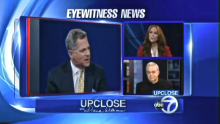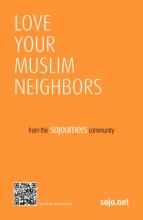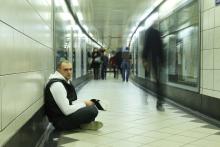love your neighbor

Maybe you've heard the buzz...
On Sunday, Sojourners' CEO Jim Wallis appeared on WABC-TV's Up Close news program in New York City to debate Pamela Geller of the Freedom Defense Initiative and Stop Islamization of America, who put up ads in NYC subway stations that read, "In any war between the civilized man and the savage, support the civilized man. Support Israel. Defeat Jihad."
Like many other folks of good faith, we at Sojourners were horrified by the blatantly hate-filled ads. We decided to do something to counter hate and fear with love and affirmation for our Muslim brothers and sisters. Last week, we began raising funds to purchase our own ad campaign in NYC subways with a simple message: "Love your Muslim neighbors."
Their debate got lively.
See for yourself inside the blog ...

The most recent discussions of U.S. foreign policy and the Middle East, once again say more about politics during an election year, than they do about the fundamental issues we must confront if we want to see substantial change.
So let’s look at the basic issues and fundamental choices we need to make.
Today the Middle East — where about 60 percent of the population is under the age of 25 — is a region dominated by humiliation and anger.
Failure + rage + the folly of youth = an incendiary mix.
The roots of anti-American hostilities in the Middle East run deep (literally and figuratively). We can start with the fact that our oil (and its economy) lies beneath their sands. Couple that with U.S. support of repressive and backward regimes, the continual presence of foreign troops on their land and in their holy places, and the endless wars waged there, ultimately fueled by the geopolitics of energy.
Add to that incindiary cocktail the unresolved Israeli/Palestinian conflict, which continues to drive the deepest emotions of mutual frustration, fear, and retaliation throughout the Middle East and the rest of the world.
Injustices and violence caused by the oil economy have sparked a reaction from dangerous religious fundamentalists in the Islamic world. Fundamentalism — in all our faith traditions — is both volatile and hard to contain once it has been unleashed, and it becomes hard to reverse its essentially reactive and predictably downward cycle.

Because the scientific evidence surrounding climate change is clear, and the implications for humankind are many, the response to these global challenges needs to be persistent, organized, and significant. As Jesus calls upon humankind to “love thy neighbor," and as the Old Testament prophets remind us to strive for justice, we recognize that within a deeply connected world “neighbor” implies all that God has created, and injustice anywhere is injustice everywhere.
So an implication of Jesus’ words and actions is to share and receive the Good News not only on Sunday mornings, but through daily acts of long-term advocacy that promotes sustainable livelihoods. With COP18 in Qatar on the horizon, the time has come when humanity can no longer afford to fight over our resources, and the moment is upon us to prod our elected officials toward legally binding legislation that values the gifts of creation that God has entrusted us to manage.
In early August, a mosque in Joplin, Mo., burned to the ground. It was the second fire that damaged the facility this summer — the first, determined to be arson. In light of this attack and others like it across the country — including the heinous shooting at a Sikh gurudwara outside of Milwaukee that killed six worshippers — Sojourners called on our community to help us get the word out that we are called to love our neighbors. All of them.
The response was overwhelming. As a result of generous contributions, Sojourners not only took out an ad in The Joplin Globe, but also erected billboards with the same message, both in Joplin and in Oak Creek, Wis., three blocks from the Sikh gurudwara.
The message is simple. "Love your Muslim neighbors." "Love your Sikh neighbors."
It's not radical in language, but it is a radical love that Jesus extends to us and asks us to show others.

For the Christian church it should be a constant question. This “greatest commandment” is given by Jesus in Matthew 22, Mark 12, Luke 10 and paraphrased here in John 13.
"A new commandment I give to you, that you love one another: just as I have loved you, you also are to love one another. By this all people will know that you are my disciples, if you have love for one another.”
So how are we doing?

Your neighbor is every man woman and child who touched the supply chain used to make your cell phone, used to make the clothes you wear, the computers you type on and the cars you drive.
Your neighbors are all of God’s children. The theological reality that people of faith try to live out is that our neighbor is not defined by geographical proximity. Our neighbor is the person in need.
Sometimes, caring for our neighbor means a change of plans. Sometimes, caring for our neighbor means we have to slow down a little bit. Sometimes, caring for our neighbor might even cost us money.
There are people who haven’t wanted to get involved in the mess by the side of the road. They walk by it and say that it’s somebody elses responsibility. My job, they say, is at the end of the road at Jericho. I’m just being faithful to my shareholders by maximizing profit. My job is just getting the products people want into the hands of those that want them. I can’t be worried about those who get left by the side of the road of my supply chain. If I stop to help clean up the mess along the way it might cost time and money.
Last night we watched the First Family light the National Christmas Tree.
We expected what we get every year: a broad message about generosity and the season of giving. But what we got was so much more.
President Obama’s remarks were encouraging. They were about the Christmas that Christians celebrate as a week of Advent, not just Christmas as a generic feeling or a season. Several news outlets, including CBN, CNN, and The Christian Post covered the story in a tone of support, somewhat surprised at the president speaking from a place of deep personal faith. His remarks were so wholly about the Christ in Christmas that it could have been delivered by a local reverend.
In "The Gospel According to the Tea Party" (November 2010), Jim Wallis overlooked points.
The way you think and feel about the world is shaped by what you see when you get out of bed in the morning. I remember hearing this from civil rights activists. It simply means that perspective is hugely determined by place, context, and vantage point. This is profoundly true for me and most of the people I've ever met. You see the world from the place you live.
Part of the problem in the current budget impasse in Washington, D.C. is the perspectives of the politicians in the debate. Every morning they see and hear each other; the gladiator ring of national politics; the Washington media; their donors; their ideological base; and their latest poll ratings.
At the climax of The King's Speech, I held my breath with the rest of the packed audience and hoped to God that history was kind to King George VI.
At the conclusion of my blog post which asked, What Constitutes Sacred Space at Ground Zero?</
The law signed today by Arizona Gov. Brewer is a social and racial sin, and should be denounced as such by people of faith and conscience across the nation.